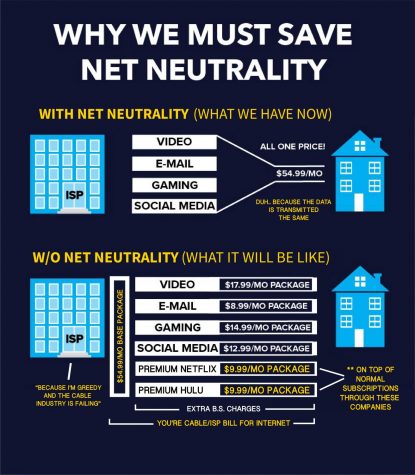Big changes coming to Internet
December 8, 2017
November 21, Federal Communications Commission chairman Ajit Pai released a plan to repeal the Obama-era “net neutrality” regulations.
While 84 percent of American adults regularly use the internet, according to Pew Research, very few know exactly what net neutrality is. As explained by the FCC, net neutrality are the rules set in place to “protect your ability to go where you want when you want online.” Without it, broadband service providers can charge additional money for access to different clusters of websites on top of a regular monthly payment as well as deliberately slow access to certain services or apps.
So, what does this mean? Think about it like this: rather than pay a monthly internet bill of about $50 a month, you would pay slightly less for your “basic” internet. However, you would then have to pay more money to access certain websites. $6 per month to use one of four clusters: a messaging cluster, social cluster, streaming cluster, and email/business cluster. From there, customers willing to pay more would get first priority “fast lane” internet access while the average person would be limited to “slow lane” internet.
For most of us, it’s hard to imagine an America where internet access isn’t defined as a utility– bills like gas, water, or trash removal. It’s simply how it has been for virtually the entirety of our lifetimes.
Call me naive, call me an idealist, whatever. But I think a growing issue which net neutrality seems to encompass is catering to the good of big corporations rather than the good of the people. I get it– corporations drive the economy. However, when it starts to feel like everywhere you look are examples of the government caring more about companies than citizens, of course I’m going to feel pretty gypped. This is good for big corporations because they will make more money and have more power. For example, a theory proposed by the New York Times: Internet service providers can decide to block content from a political party that did not align with their political views.
What purpose does net neutrality serve other than giving big business more control? My bank account gets smaller so that theirs can get larger. My internet is slower so that they can push the websites they own. Try to tell the new, small startup companies, whose websites will get next to no web traffic as a result that this repeal, is for the good of the economy.
Repealing net neutrality will do nothing but help corporations at the cost of peoples’ convenience. While on some issues, citizens can contact their representatives to voice dissatisfaction, this is within the FCC’s hands. With the threat of repeal, it’s become clear how much we have taken net neutrality for granted. After the December 14 vote, the way we use the Internet may be drastically changed.

